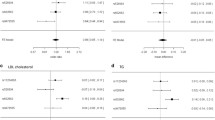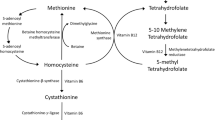Abstract
Purpose
Meta-analyses have suggested an effect of MTHFR C677T genotype (rs1801133), a proxy for blood total homocysteine, on cardiovascular disease (CVD) in populations with low population dietary folate. The aim was to examine the association and effect modification by serum folate and vitamin B12 levels between MTHFR and CVD-related outcomes in a general population with no mandatory folic acid fortification policy.
Methods
The study population included 13,748 adults retrieved from pooling of four population-based studies conducted in Denmark. MTHFR genotype, serum folate (measured in approximately 9,356 individuals), and serum vitamin B12 (9,215 individuals), hypertension, and dyslipidemia were measured at baseline, and participants were followed for a mean of 10.5–11.7 years in central registries for diagnoses of stroke (623 incidents), ischaemic heart disease (IHD) (835 incidents), and all-cause mortality (1,272 incidents).
Results
The MTHFR genotype (TT vs. CC/CT) was not associated with hypertension [OR (95 % CI) 1.09 (0.95–1.25)], dyslipidemia [OR (95 % CI) 0.97 (0.84–1.11)], stroke [HR (95 % CI) 0.92 (0.69–1.23)], and all-cause mortality [HR (95 % CI) 0.94 (0.77–1.14)], either overall, or in participants with low serum folate or B12 status (P values for interactions 0.15–0.94). Individuals with the MTHFR TT genotype had a higher risk of IHD (HR (95 % CI) 1.38 (1.11–1.71)), but this association was not modified by folate status (P value for interaction 0.45).
Conclusions
Our results do not support a causal relationship between homocysteine and CVD. However, we cannot exclude a direct causal effect of MTHFR C677T genotype on IHD.
Similar content being viewed by others
References
Homocysteine studies collaboration (2002) Homocysteine and risk of ischemic heart disease and stroke: a meta-analysis. JAMA 288:2015–2022
Wald DS, Law M, Morris JK (2002) Homocysteine and cardiovascular disease: evidence on causality from a meta-analysis. BMJ 325:1202
Toole JF, Malinow MR, Chambless LE, Spence JD, Pettigrew LC et al (2004) Lowering homocysteine in patients with ischemic stroke to prevent recurrent stroke, myocardial infarction, and death: the Vitamin Intervention for Stroke Prevention (VISP) randomized controlled trial. JAMA 291:565–575
Lonn E, Yusuf S, Arnold MJ, Sheridan P, Pogue J et al (2006) Homocysteine lowering with folic acid and B vitamins in vascular disease. N Engl J Med 354:1567–1577
Bonaa KH, Njolstad I, Ueland PM, Schirmer H, Tverdal A et al (2006) Homocysteine lowering and cardiovascular events after acute myocardial infarction. N Engl J Med 354:1578–1588
Ebbing M, Bleie O, Ueland PM, Nordrehaug JE, Nilsen DW et al (2008) Mortality and cardiovascular events in patients treated with homocysteine-lowering B vitamins after coronary angiography: a randomized controlled trial. JAMA 300:795–804
Albert CM, Cook NR, Gaziano JM, Zaharris E, MacFadyen J et al (2008) Effect of folic acid and B vitamins on risk of cardiovascular events and total mortality among women at high risk for cardiovascular disease: a randomized trial. JAMA 299:2027–2036
Armitage JM, Bowman L, Clarke RJ, Wallendszus K, Bulbulia R et al (2010) Effects of homocysteine-lowering with folic acid plus vitamin B12 vs placebo on mortality and major morbidity in myocardial infarction survivors: a randomized trial. JAMA 303:2486–2494
VITATOPS trial study group (2010) B vitamins in patients with recent transient ischaemic attack or stroke in the VITAmins TO Prevent Stroke (VITATOPS) trial: a randomised, double-blind, parallel, placebo-controlled trial. Lancet Neurol 9:855–865
Homocysteine Lowering Trialists’ Collaboration (1998) Lowering blood homocysteine with folic acid based supplements: meta-analysis of randomised trials. Homocysteine Lowering Trialists’ Collaboration. BMJ 316:894–898
Holmes MV, Newcombe P, Hubacek JA, Sofat R, Ricketts SL et al (2011) Effect modification by population dietary folate on the association between MTHFR genotype, homocysteine, and stroke risk: a meta-analysis of genetic studies and randomised trials. Lancet 378:584–594
Huo Y, Qin X, Wang J, Sun N, Zeng Q et al (2012) Efficacy of folic acid supplementation in stroke prevention: new insight from a meta-analysis. Int J Clin Pract 66:544–551
Frosst P, Blom HJ, Milos R, Goyette P, Sheppard CA et al (1995) A candidate genetic risk factor for vascular disease: a common mutation in methylenetetrahydrofolate reductase. Nat Genet 10:111–113
Husemoen LL, Thomsen TF, Fenger M, Jorgensen HL, Jorgensen T (2003) Contribution of thermolabile methylenetetrahydrofolate reductase variant to total plasma homocysteine levels in healthy men and women. Inter99 (2). Genet Epidemiol 24:322–330
Casas JP, Bautista LE, Smeeth L, Sharma P, Hingorani AD (2005) Homocysteine and stroke: evidence on a causal link from mendelian randomisation. Lancet 365:224–232
Klerk M, Verhoef P, Clarke R, Blom HJ, Kok FJ et al (2002) MTHFR 677C– > T polymorphism and risk of coronary heart disease: a meta-analysis. JAMA 288:2023–2031
Lewis SJ, Ebrahim S, Davey SG (2005) Meta-analysis of MTHFR 677C- > T polymorphism and coronary heart disease: does totality of evidence support causal role for homocysteine and preventive potential of folate? BMJ 331:1053
Chiuve SE, Giovannucci EL, Hankinson SE, Hunter DJ, Stampfer MJ et al (2005) Alcohol intake and methylenetetrahydrofolate reductase polymorphism modify the relation of folate intake to plasma homocysteine. Am J Clin Nutr 82:155–162
de Bree A, Verschuren WM, Bjorke-Monsen AL, van der Put NM, Heil SG et al (2003) Effect of the methylenetetrahydrofolate reductase 677C– > T mutation on the relations among folate intake and plasma folate and homocysteine concentrations in a general population sample. Am J Clin Nutr 77:687–693
Hustad S, Midttun O, Schneede J, Vollset SE, Grotmol T et al (2007) The methylenetetrahydrofolate reductase 677C– > T polymorphism as a modulator of a B vitamin network with major effects on homocysteine metabolism. Am J Hum Genet 80:846–855
Davey-Smith G (2010) Mendelian andomization for strengthening causal inference in observational studies: application to gene × environment interactions. Perspectives on Psychological Science 5:527–545
Thuesen BH, Husemoen LL, Ovesen L, Jorgensen T, Fenger M et al (2010) Lifestyle and genetic determinants of folate and vitamin B12 levels in a general adult population. Br J Nutr 103:1195–1204
Hersoug LG, Husemoen LL, Thomsen SF, Sigsgaard T, Thuesen BH et al (2010) Association of indoor air pollution with rhinitis symptoms, atopy and nitric oxide levels in exhaled air. Int Arch Allergy Immunol 153:403–412
Jorgensen T, Borch-Johnsen K, Thomsen TF, Ibsen H, Glumer C et al (2003) A randomized non-pharmacological intervention study for prevention of ischaemic heart disease: baseline results Inter99. Eur J Cardiovasc Prev Rehabil 10:377–386
Husemoen LL, Fenger M, Friedrich N, Tolstrup JS, Beenfeldt FS et al (2008) The association of ADH and ALDH gene variants with alcohol drinking habits and cardiovascular disease risk factors. Alcohol Clin Exp Res 32:1984–1991
Husemoen LL, Skaaby T, Thuesen BH, Jorgensen T, Fenger RV et al (2012) Serum 25(OH)D and incident type 2 diabetes: a cohort study. Eur J Clin Nutr
Husemoen LL, Jorgensen T, Borch-Johnsen K, Hansen T, Pedersen O et al (2010) The association of alcohol and alcohol metabolizing gene variants with diabetes and coronary heart disease risk factors in a white population. PLoS ONE 5:e11735
Albrechtsen A, Grarup N, Li Y, Sparso T, Tian G et al (2012) Exome sequencing-driven discovery of coding polymorphisms associated with common metabolic phenotypes. Diabetologia
Thuesen BH, Husemoen LL, Fenger M, Linneberg A (2009) Lack of association between the MTHFR (C677T) polymorphism and atopic disease. Clin Respir J 3:102–108
Pfeiffer CM, Caudill SP, Gunter EW, Osterloh J, Sampson EJ (2005) Biochemical indicators of B vitamin status in the US population after folic acid fortification: results from the National Health and Nutrition Examination Survey 1999–2000. Am J Clin Nutr 82:442–450
Andersen TF, Madsen M, Jorgensen J, Mellemkjoer L, Olsen JH (1999) The Danish national hospital register. A valuable source of data for modern health sciences. Dan Med Bull 46:263–268
Juel K, Helweg-Larsen K (1999) The Danish registers of causes of death. Dan Med Bull 46:354–357
Brattstrom L, Wilcken DE, Ohrvik J, Brudin L (1998) Common methylenetetrahydrofolate reductase gene mutation leads to hyperhomocysteinemia but not to vascular disease: the result of a meta-analysis. Circulation 98:2520–2526
Nygard O, Vollset SE, Refsum H, Stensvold I, Tverdal A et al (1995) Total plasma homocysteine and cardiovascular risk profile. The Hordaland Homocysteine Study. JAMA 274:1526–1533
Husemoen LL, Linneberg A, Fenger M, Thuesen BH, Jorgensen T (2009) Changes in lifestyle, biological risk factors and total homocysteine in relation to MTHFR C677T genotype: a 5-year follow-up study. Eur J Clin Nutr 63:1233–1240
Husemoen LL, Thomsen TF, Fenger M, Jorgensen T (2006) Changes in lifestyle and total homocysteine in relation to MTHFR(C677T) genotype: the Inter99 study. Eur J Clin Nutr 60:614–622
de Bree A, Verschuren WM, Blom HJ (2001) Biological cardiovascular risk factors and plasma homocysteine levels in the general Dutch population. Atherosclerosis 154:513–514
Yang Q, Bailey L, Clarke R, Flanders WD, Liu T et al (2012) Prospective study of methylenetetrahydrofolate reductase (MTHFR) variant C677T and risk of all-cause and cardiovascular disease mortality among 6000 US adults. Am J Clin Nutr 95:1245–1253
Zee RY, Mora S, Cheng S, Erlich HA, Lindpaintner K et al (2007) Homocysteine, 5,10-methylenetetrahydrofolate reductase 677C > T polymorphism, nutrient intake, and incident cardiovascular disease in 24,968 initially healthy women. Clin Chem 53:845–851
Williams C, Kingwell BA, Burke K, McPherson J, Dart AM (2005) Folic acid supplementation for 3 wk reduces pulse pressure and large artery stiffness independent of MTHFR genotype. Am J Clin Nutr 82:26–31
Markan S, Sachdeva M, Sehrawat BS, Kumari S, Jain S et al (2007) MTHFR 677 CT/MTHFR 1298 CC genotypes are associated with increased risk of hypertension in Indians. Mol Cell Biochem 302:125–131
Acknowledgments
The present study was supported by grants from the Health Insurance Foundation (Grant No. 2010 B 131), and the Danish Agency for Science Technology and Innovation (Grant No. 2101-06-0065). The Novo Nordisk Foundation Center for Basic Metabolic Research is an independent Research Center at the University of Copenhagen partially funded by an unrestricted donation from the Novo Nordisk Foundation (www.metabol.ku.dk). The study was partially funded by the Lundbeck Foundation (The Lundbeck Foundation Centre for Applied Medical Genomics in Personalised Disease Prediction, Prevention and Care (LuCamp), www.lucamp.org).
Conflict of interest
On behalf of all authors, the corresponding author states that there is no conflict of interest.
Author information
Authors and Affiliations
Corresponding author
Rights and permissions
About this article
Cite this article
Husemoen, L.L.N., Skaaby, T., Jørgensen, T. et al. MTHFR C677T genotype and cardiovascular risk in a general population without mandatory folic acid fortification. Eur J Nutr 53, 1549–1559 (2014). https://doi.org/10.1007/s00394-014-0659-2
Received:
Accepted:
Published:
Issue Date:
DOI: https://doi.org/10.1007/s00394-014-0659-2




